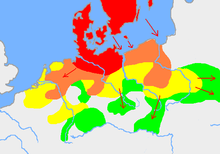ක්රි. ව. 1


සිදුවීම්
සංස්කරණයමහාද්වීපය අනුව
සංස්කරණයයුරෝපය / රෝම අධිරාජ්යය
සංස්කරණය- Tiberius, under order of Augustus, quells revolts in Germania (1–5).
- Gaius Caesar and Lucius Aemilius Paullus are appointed consuls.
- Gaius Caesar marries Livilla, daughter of Antonia Minor and Nero Claudius Drusus, in an effort to gain prestige.
- Quirinius becomes a chief advisor to Gaius in Armenia. Gnaeus Domitius Ahenobarbus, whose father Lucius Domitius Ahenobarbus had served as consul in 16 BC, also serves in the Armenia campaigns.
- The Aqua Alsietina aqueduct is constructed.
- Areius Paianeius becomes Archon of Athens.
ආසියාව
සංස්කරණය- The Yuanshi era of the Chinese Han Dynasty begins.
- Confucius is given his first royal title (posthumous name) of Lord Baochengxun Ni.
- Emperor Ping of Han China begins his reign and Wang Mang is re-instated as regent by Grand Empress Dowager Wang.
- Former regent Dong Xian commits suicide.
- Sapadbizes, Yuezhi prince and King of Kush (Bactria), dies. Heraios succeeds him as king.
අප්රිකාව
සංස්කරණය- The Kingdom of Aksum, centered in modern day ඉතියෝපියාව and Eritrea, is founded (approximate date).
- Amanishakheto, Queen of Kush (Nubia), dies. Her son, Natakamani, becomes King of Kush.
අමෙරිකා
සංස්කරණය- Moxos ceases to be a significant religious area in South America (approximate date).
- The Teotihuacan culture in Mesoamerica begins (approximate date).
- The Maya practice sacrifice and mutilation.
- The Olmec II phase of the Olmec civilization begins; San Lorenzo and La Venta grow in popualation.
විශයය අනුව
සංස්කරණයකලාව
සංස්කරණය- The poem Metamorphoses is written by Ovid.
- Livy writes his monumental History of Rome (Ab Urbe Condita).
ආගම්
සංස්කරණය- Birth of Jesus, as assigned by Dionysius Exiguus in his anno Domini era according to at least one scholar.[1][2] However, most scholars think Dionysius placed the birth of Jesus in the previous year, 1 BC.[1][2] Despite this, most modern scholars do not consider Dionysius' calculations authoritative, placing the event several years earlier (see Chronology of Jesus).[3]
- ^ a b Georges Declercq, Anno Domini: The origins of the Christian Era (Turnhout, Belgium: Brepols, 2000), pp.143–147.
- ^ a b G. Declercq, "Dionysius Exiguus and the introduction of the Christian Era", Sacris Erudiri 41 (2002) 165–246, pp.242–246. Annotated version of a portion of Anno Domini.
- ^ James D. G. Dunn, Jesus Remembered, Eerdmans Publishing (2003), page 324.